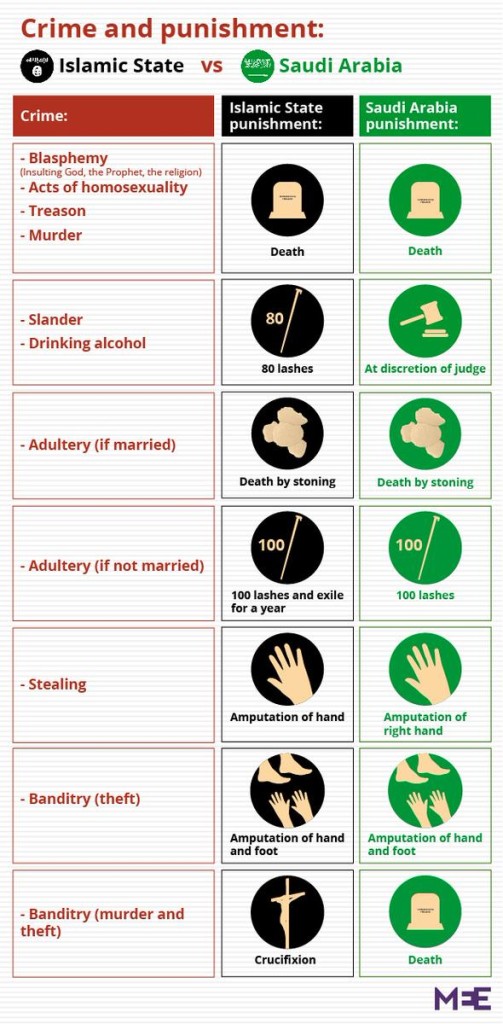How Saudi Arabia’s Harsh Legal Punishments Compare to the Islamic State’s
MIDDLE EAST AND NORTH AFRICA, 26 Jan 2015
Adam Taylor – The Washington Post
Documents Show Saudi Arabia and ISIS Administer Nearly Identical Punishments for Crimes
21 Jan 2015 – Following the lashing of blogger Raif Badawi and leaked footage that showed the public execution of a woman accused of beating her daughter, Saudi Arabia’s harsh interpretation of sharia law and its use of capital punishment have come under international scrutiny.
For many, the Saudi justice system sounds not unlike that of the Islamic State, the extremist Islamist group which has struck fear in much of the Middle East.
This week, Middle East Eye, a Web site that focuses on news from the region and is frequently critical of Saudi Arabia, contrasted a set of legal punishments recently announced by the Islamic State with the corresponding punishments in Saudi Arabia. While Saudi Arabia isn’t particularly forthcoming about its use of capital punishment (and Middle East Eye doesn’t cite its source) and accurate information from within the Islamic State’s self-proclaimed caliphate is hard to ascertain, information from news sources and human rights organizations suggest the chart is at least broadly accurate.
While Saudi Arabia isn’t particularly forthcoming about its use of capital punishment (and Middle East Eye doesn’t cite its source) and accurate information from within the Islamic State’s self-proclaimed caliphate is hard to ascertain, information from news sources and human rights organizations suggest the chart is at least broadly accurate.
One key difference between the Islamic State and Saudi Arabia, of course, is that the latter is a key U.S. ally in the region – and a member of the U.S.-led coalition fighting the Islamic State. Some experts argue that the fundamentalist brand of Islam practiced by both has theological links, however, and Riyadh’s recent crackdown has been interpreted as an act of appeasement for Saudi hard-liners.
Saudi Arabia’s own concern about the Islamic State is likely genuine (plans to build an enormous wall along its border with Iraq are a good sign of that), but for many Americans, the extremist group’s rise is also bringing with it a renewed skepticism about American allies in the region.
___________________________
Adam Taylor writes about foreign affairs for The Washington Post. Originally from London, he studied at the University of Manchester and Columbia University.
Go to Original – washingtonpost.com
DISCLAIMER: The statements, views and opinions expressed in pieces republished here are solely those of the authors and do not necessarily represent those of TMS. In accordance with title 17 U.S.C. section 107, this material is distributed without profit to those who have expressed a prior interest in receiving the included information for research and educational purposes. TMS has no affiliation whatsoever with the originator of this article nor is TMS endorsed or sponsored by the originator. “GO TO ORIGINAL” links are provided as a convenience to our readers and allow for verification of authenticity. However, as originating pages are often updated by their originating host sites, the versions posted may not match the versions our readers view when clicking the “GO TO ORIGINAL” links. This site contains copyrighted material the use of which has not always been specifically authorized by the copyright owner. We are making such material available in our efforts to advance understanding of environmental, political, human rights, economic, democracy, scientific, and social justice issues, etc. We believe this constitutes a ‘fair use’ of any such copyrighted material as provided for in section 107 of the US Copyright Law. In accordance with Title 17 U.S.C. Section 107, the material on this site is distributed without profit to those who have expressed a prior interest in receiving the included information for research and educational purposes. For more information go to: http://www.law.cornell.edu/uscode/17/107.shtml. If you wish to use copyrighted material from this site for purposes of your own that go beyond ‘fair use’, you must obtain permission from the copyright owner.
Read more
Click here to go to the current weekly digest or pick another article:
MIDDLE EAST AND NORTH AFRICA:
